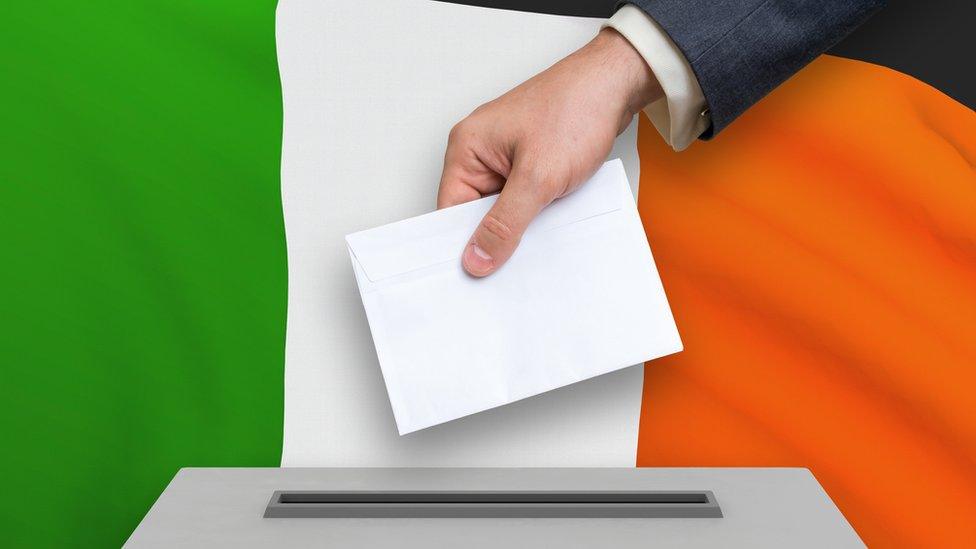Leo Varadkar becomes taoiseach as Micheál Martin steps down
- Published
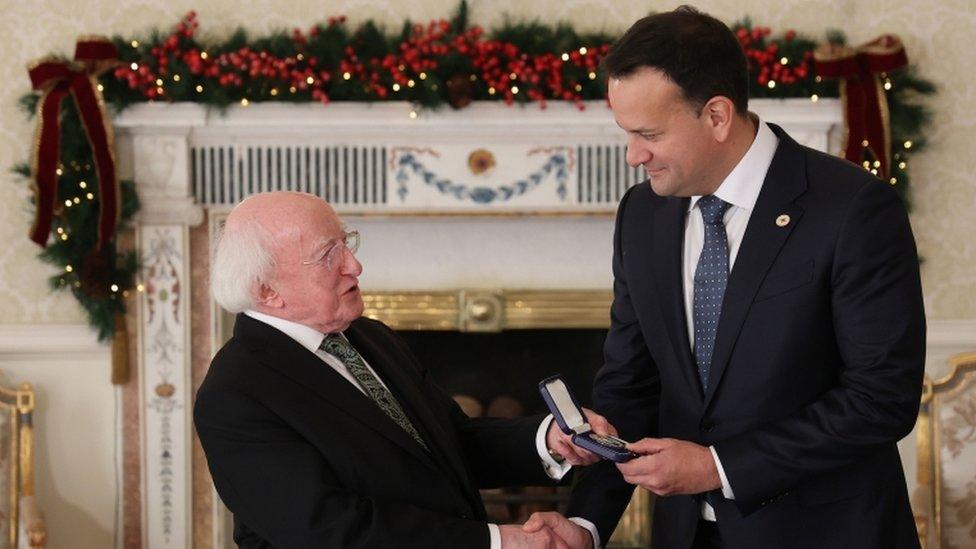
Irish President Michael D Higgins (left) congratulated Leo Varadkar on becoming taoiseach
Ireland has a new taoiseach (prime minister) - Leo Varadkar - as he and Micheál Martin swap roles.
Eighty-seven TDs in the Dáil (Irish Parliament) voted to elect Mr Varadkar, while 62 were against his nomination.
Mr Varadkar takes over from Mr Martin as government leader, while Mr Martin takes on his role as tánaiste (deputy prime minister).
Mr Martin will also be minister for foreign affairs as Simon Coveney moves to the Department of Enterprise.
The rotation of power between the Irish parties was laid down in the coalition agreement of June 2020.
The deal brought together Mr Varadkar's Fine Gael party, Mr Martin's Fianna Fáil and the Green Party in a historic compromise.
Mr Varadkar, a qualified medical doctor, previously served as taoiseach and minister of defence from 2017 to 2020.
The handover is a first for the Republic of Ireland's political system and takes place between two parties which dominated Irish politics as bitter rivals for almost a century.


This swap-at-the-top has never happened before.
In the past, a coalition between Fianna Fáil and Fine Gael would have been thought to be as unlikely as Labour and the Conservatives going into government together in London.
Now, the Fianna Fáil leader Micheál Martin has handed over the most important job in Ireland to his Fine Gael counterpart, Leo Varadkar.
The parties agreed the deal after a general election in 2020, when Sinn Féin surged to win the most first-preference votes.
The leader of the opposition - Mary Lou McDonald - was predictably scathing in her attacks on Mr Varadkar during the parliamentary proceedings.
Polls suggest she is in line to replace Mr Varadkar as taoiseach in the next Dáil election, due by early 2025.
Domestic politics in the next two years are set to be dominated by housing, healthcare, and the cost of living.
Mr Varadkar's relations with Rishi Sunak will be particularly important, as the UK and the EU continue to negotiate on Brexit trading arrangements for Northern Ireland.
There is another interesting moment in history today - Britain and its nearest neighbour, Ireland, are now both led by men of Indian heritage.

Addressing the Dáil following his appointment on Saturday, Mr Varadkar said his mission would be to build on the achievement of 100 years ago and work on what needs to done for this generation and the next.
He said he wanted to provide "new hope and new opportunities for all our citizens" and to see "housing, economic opportunity and a fair start for all".
The new taoiseach said there were many challenges.
"Ireland has never been a failed state," he said, "and it is grotesque and dishonest to claim that we are or we were.
"But we are failing some of our citizens, and it is essential to our success as a country that we put this right."
Mr Varadkar reaffirmed the Irish commitment to stand with fellow Europeans through this "harsh winter".
"Dreams of a better future are not built on stalemate and the status quo," he added.
"I want to work with all parties in this house and in Northern Ireland, as well as with the British government and our partners in the European Union, to make progress on the protocol and restore the institutions of the agreement."
Northern Ireland Secretary Chris Heaton-Harris said he wished Mr Varadkar well and said the relationship between the UK and Ireland is "so valuable".
Allow X content?
This article contains content provided by X. We ask for your permission before anything is loaded, as they may be using cookies and other technologies. You may want to read X’s cookie policy, external and privacy policy, external before accepting. To view this content choose ‘accept and continue’.
In the new line-up, Stephen Donnelly is to remain as health minister, Simon Harris will be justice minister as well as leading in further and higher education, research, innovation and science for a period and Charlie McConalogue will hold on to his role as agriculture minister.
The coalition agreement originally specified that the handover would be on 15 December but this was changed in order to allow Mr Martin to participate in the final EU leaders' summit of the year in Brussels this week.
Mr Martin then offered his resignation to President Higgins, automatically dissolving the government.
While addressing the Dáil, Mr Martin referenced Northern Ireland during his speech.
"If we genuinely believe in an Ireland which includes and serves all, then we must be prepared to build new bridges," he said.
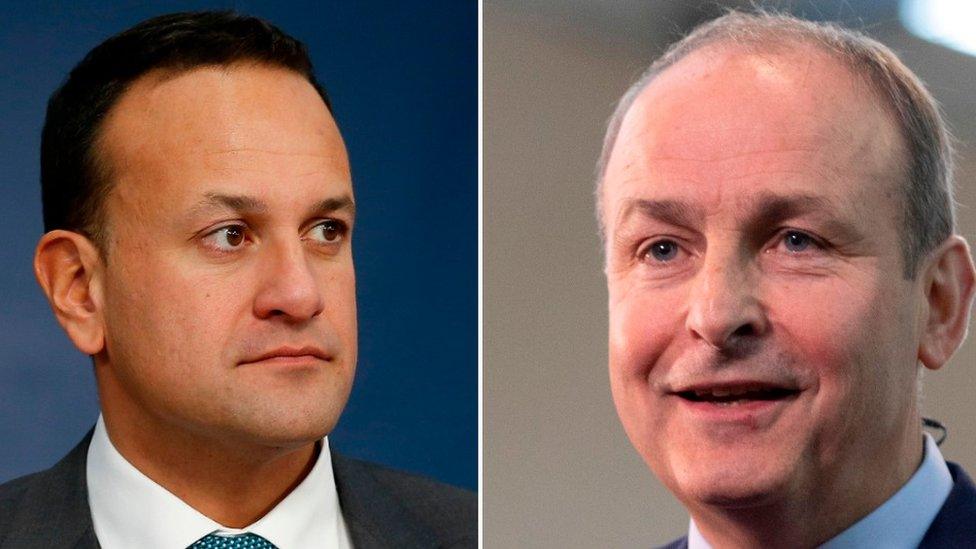
Leo Varadkar (left) replaces Micheál Martin as taoiseach in line with a coalition agreement
"We must be prepared to reach across divides and to do the hard work of learning to understand and respect each other far more than we have in the past.
"We must stop making assumptions about each other and get to know each other," he added.


When Leo Varadkar first became taoiseach in 2017, he was seen internationally as a symbol of a new and much changed Ireland.
A gay man of Indian heritage, he was certainly a break with the past.
He takes the reins for a second time as issues over the Brexit-related Northern Ireland Protocol remain unresolved between the EU and the UK.
Unionist opposition to the protocol means no government at Stormont.
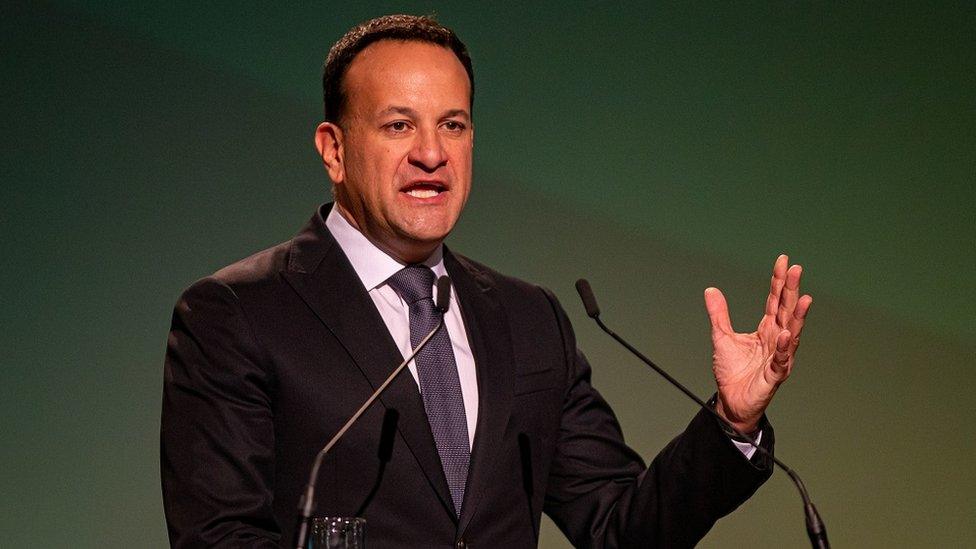
And that casts a shadow over planned celebrations to mark the 25th anniversary of the Good Friday Agreement - the 1998 deal designed to end 30 years of bloody conflict in Northern Ireland.
When he meets Rishi Sunak, another prime minister of Indian heritage, resolving difficulties over the protocol will be the key priority.
Inevitably the responsibility of being in government takes the sheen off most politicians who come to power promising something new.
Domestically, Mr Varadkar and his fellow ministers in the three-party coalition will have to convince a sceptical electorate that they are delivering on housing, heath and the cost of living.
Otherwise there is likely to be a Sinn Féin government in two-and-a-half years time with Mary Lou McDonald replacing him as taoiseach.
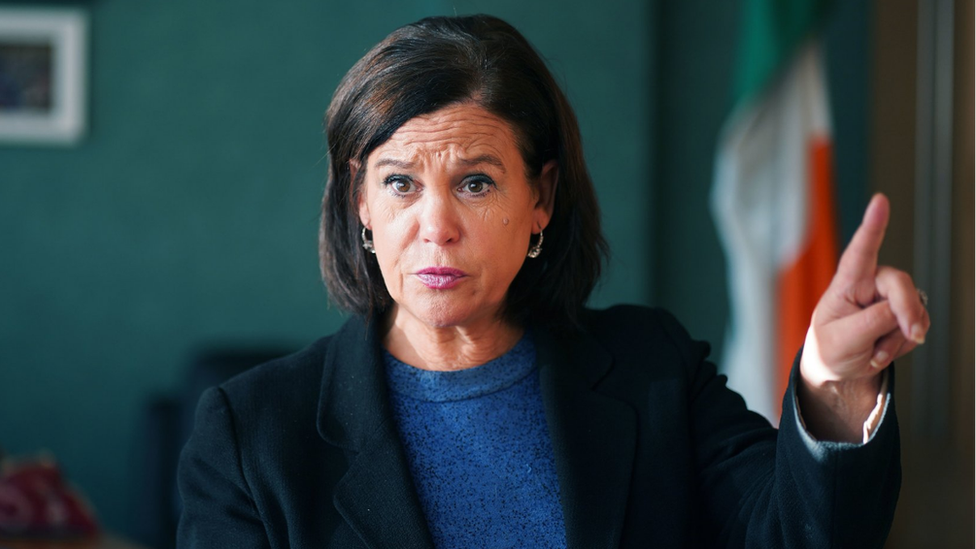
Mary Lou McDonald accused the coalition of being "out of touch, out of ideas and out of time"
Speaking in the Dáil on Saturday, the Sinn Féin leader said Ireland needed a general election, not a rotation of leader.
Ms McDonald accused the coalition of being "out of touch, out of ideas and out of time" and questioned Mr Martin's assertion that the government was delivering.
She also challenged his claim that there were no easy answers to Ireland's problems.
"You all say that there are no easy answers, but I don't think that's an acceptable response to those mothers frantic because their children wait and wait for vital surgery, for essential services, for assessment of needs, to families distressed because they can't pay the latest bill, the mortgage repayment or afford the rent, to a child growing up in a B&B or a hotel room," she said.

Mr Varadkar is also vacating his post as minister for enterprise, trade and employment.
It took four months to negotiate the coalition agreement following the February 2020 election. Under the deal, six senior ministerial posts were each allocated to Fianna Fáil and Fine Gael, and three to the Green Party.
Fine Gael and Fianna Fáil, for decades the largest parties in the Republic of Ireland, trace their origins to the opposing sides in the Irish Civil War of the early 1920s.
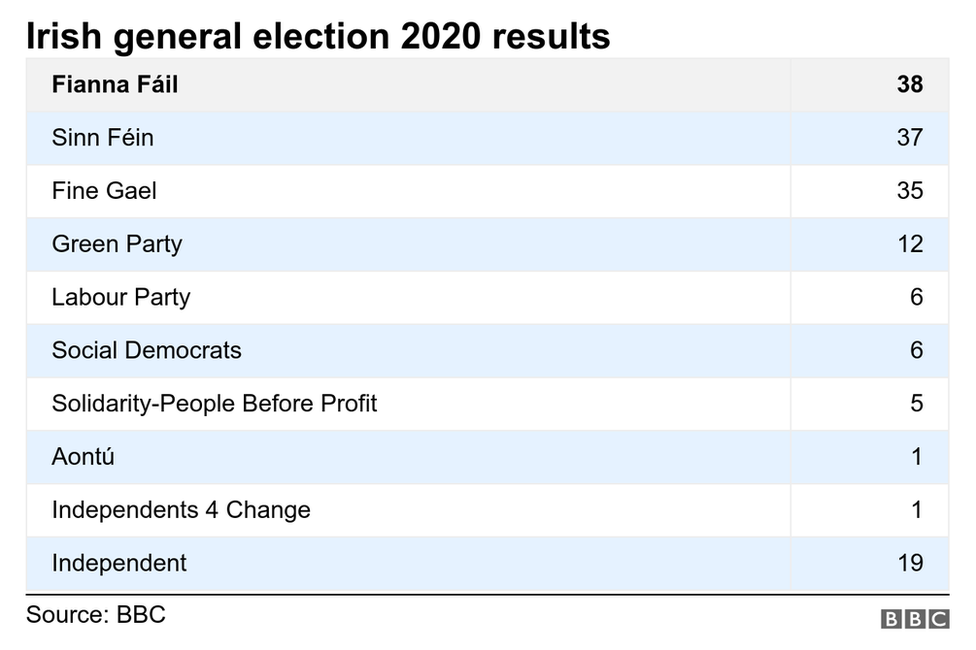
The 2020 election saw a rise in popularity for the left-leaning republican party, Sinn Féin, which won the most first-preference votes and ran a close second to Fianna Fáil in the number of seats taken.
Recent opinion polls have suggested that support for Sinn Féin currently stands well ahead of the coalition parties and has done for some time.
A former minister for health, Mr Martin's time as taoiseach has been dominated by Covid, the war in Ukraine and the stand-off between the European Union and the UK over the Northern Ireland Protocol.
Related topics
- Published26 June 2020
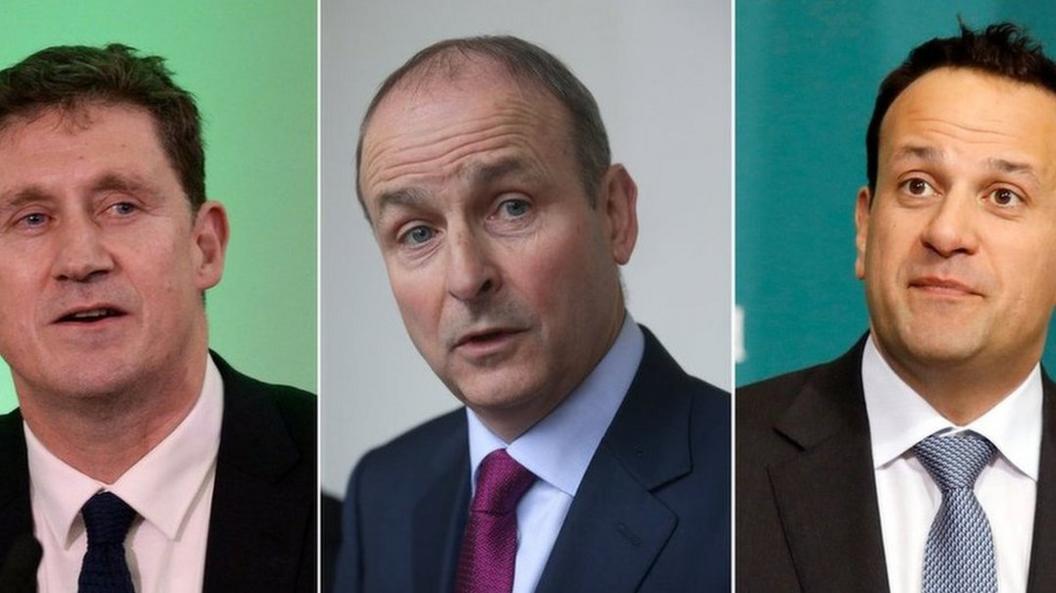
- Published3 April 2023
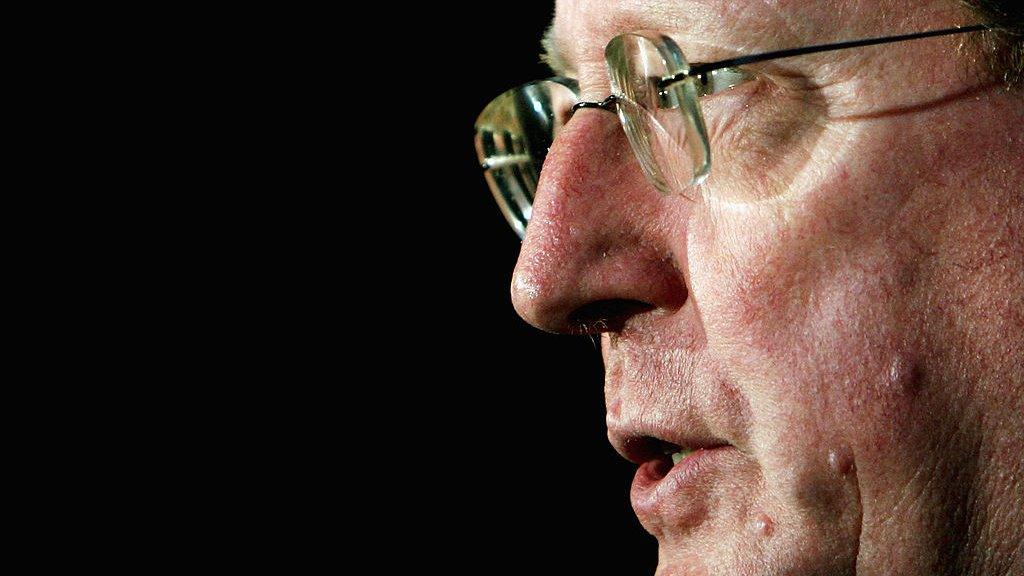
- Published10 February 2020
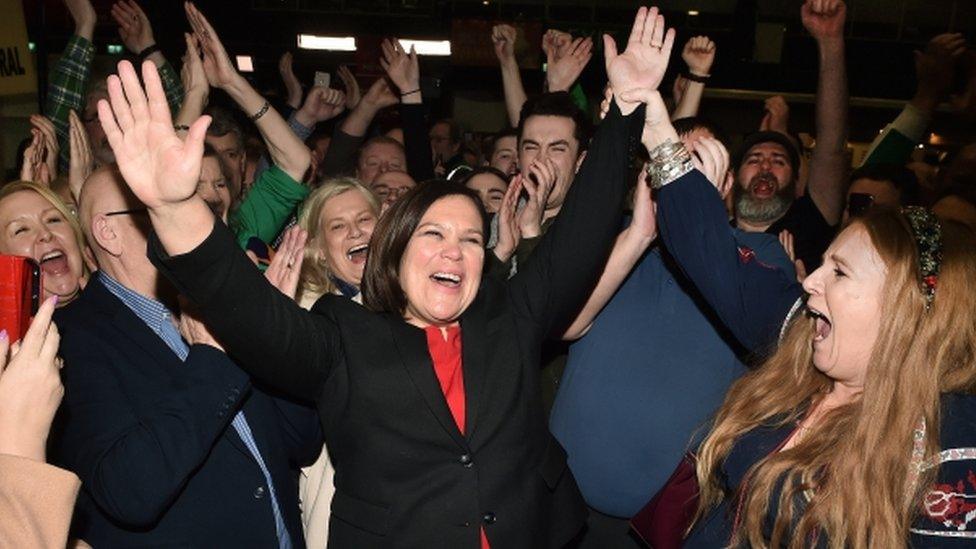
- Published13 February 2020
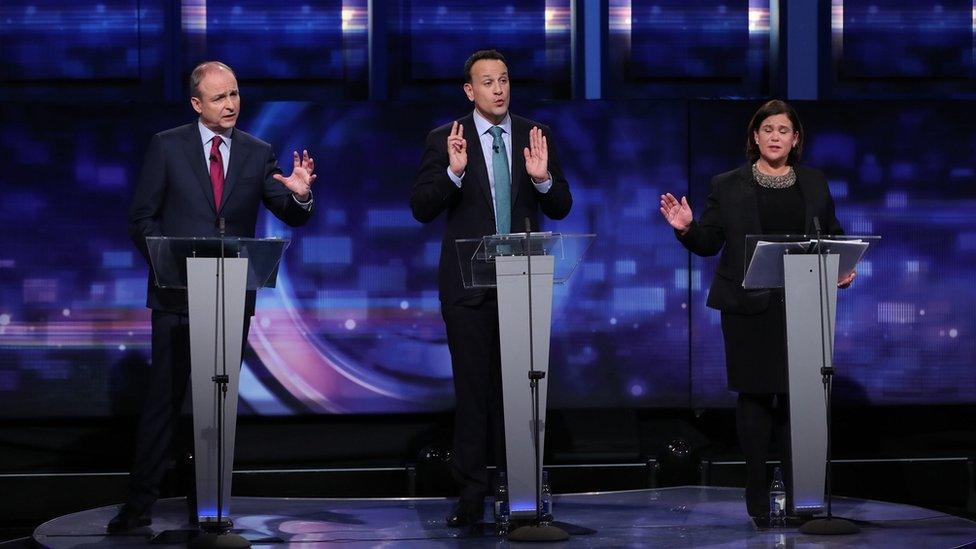
- Published2 February 2024

- Published6 February 2020
